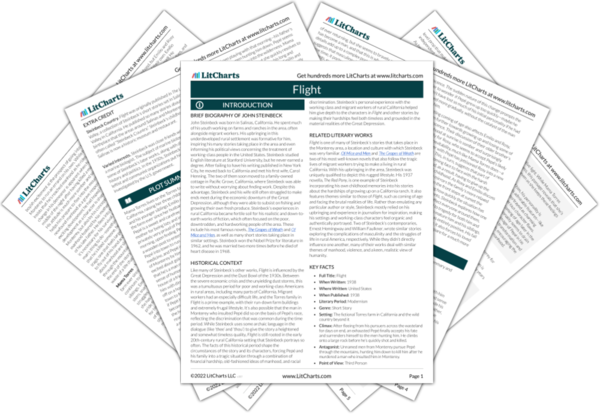The question of Pepé’s manhood defines the story from beginning to end, informing his actions and the way people treat him at every turn. He begins as a lazy and easygoing boy, telling his skeptical mother that he’s become a man now as he ventures out to complete the errands he’s been given. But when he returns home, having killed a man, he begins to understand his mother’s harsh conception of manhood in a more meaningful and immediate sense. The events of the story associate masculinity not only with violence, but with death and killing. Almost every “real” man in the story—including Pepé, his father, and the man who insulted Pepé—either kills or is killed. Although Pepé’s father’s death was an accident, it establishes the story’s correlation between masculinity and an early demise. Courage, the willingness to kill, and dying an honorable death are traditionally hallmarks of masculinity, and Steinbeck uses them to full effect while still painting Pepé’s grueling journey as tragic and perhaps even unnecessary. Mama Torres mourns her son as he flees toward the mountains, knowing he has little chance of ever returning, but she seems to bravely accept that her son has become a man, and that this is what men must do. These details add up to a complex portrayal of masculinity. The story suggests that masculine violence is senselessly tragic, but at the same time, it portrays Pepé as quietly brave in his final moments, even when his “manhood” boils down to little more than valiant surrender. Although he loses all the masculine trappings and symbolic objects his father left him, he ultimately becomes a man without them, in his own way.
Manhood ThemeTracker

Manhood Quotes in Flight
And there was Pepé, the tall smiling son of nineteen, a gentle, affectionate boy, but very lazy. Pepé had a tall head, pointed at the top, and from its peak, coarse black hair grew down like a thatch all around. Over his smiling little eyes Mama cut a straight bang so he could see. Pepé had sharp Indian cheek bones and an eagle nose, but his mouth was as sweet and shapely as a girl’s mouth, and his chin was fragile and chiseled. He was loose and gangling, all legs and feet and wrists, and he was very lazy. Mama thought him fine and brave, but she never told him so.
Emilio said, “Some day I too will ride to Monterey for medicine. Did Pepé come to be a man today?”
Mama said wisely, “A boy gets to be a man when a man is needed. Remember this thing. I have known boys forty years old because there was no need for a man.”
He was changed. The fragile quality seemed to have gone from his chin. His mouth was less full than it had been, the lines of the lips were straighter, but in his eyes the greatest change had taken place. There was no laughter in them any more, nor any bashfulness. They were sharp and bright and purposeful.
When the grey shape of Pepé melted into the hillside and disappeared, Mama relaxed. She began the high, whining keen of the death wail. “Our beautiful —our brave,” she cried. “Our protector, our son is gone.” Emilio and Rosy moaned beside her. “Our beautiful—our brave, he is gone.”
Rosy looked around at him. She drew her knowledge from the quiet air. “He has gone on a journey. He will never come back.”
“Is he dead? Do you think he is dead?”
Rosy looked back at the ocean again. A little steamer, drawing a line of smoke sat on the edge of the horizon. “He is not dead,” Rosy explained. “Not yet.”
He sat down in the crisp dry oak leaves and automatically felt for his big black knife to cut the jerky, but he had no knife. He leaned back on his elbow and gnawed at the tough strong meat. His face was blank, but it was a man’s face.
The coat of his father pressed on his arm. His tongue was swollen until it nearly filled his mouth. He wriggled out of the coat and dropped it in the brush, and then he struggled up the hill, falling over rocks and tearing his way through the brush. The rifle knocked against stones as he went. Little dry avalanches of gravel and shattered stone went whispering down the hill behind him.
Pepé bowed his head quickly. He tried to speak rapid words but only a thick hiss came from his lips. He drew a shaky cross on his breast with his left hand. It was a long struggle to get to his feet. He crawled slowly and mechanically to the top of a big rock on the ridge peak.











